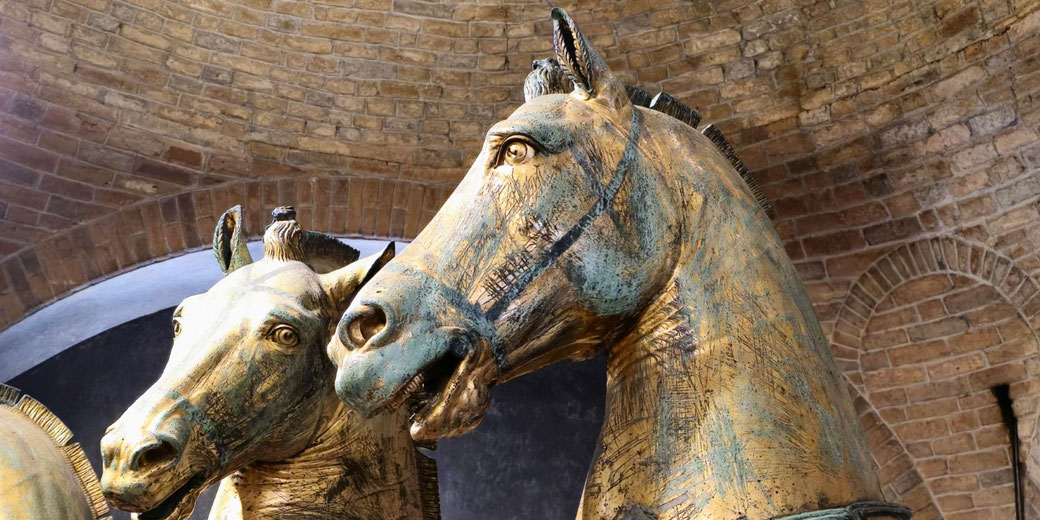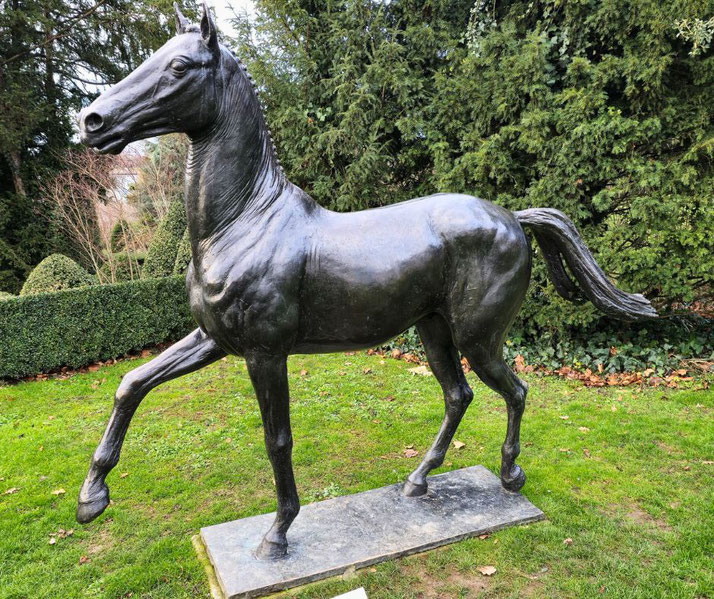What happened when mad emperor Caligula made his favourite horse a Roman consul?

The Roman Empire is filled with fascinating tales of power, politics, and intrigue. One of the most intriguing and enduring legends from ancient Rome is that of Emperor Caligula and his proposal to make his horse, Incitatus, a consul.
As one of the most bizarre episodes in Roman history, the story has captured the imagination of historians and the general public alike for centuries.
The consulship was a highly respected and influential position in Roman society, responsible for governing and administering the empire.
The idea of a horse occupying such a prestigious role is both intriguing and perplexing.
But how true is it, and what happened when the emperor tried to do it?
Early Life and Rise to Power of Caligula
Caligula, born as Gaius Julius Caesar Augustus Germanicus in 12 AD, was the third Roman emperor, ruling from 37 AD until his assassination in 41 AD.
He hailed from the Julio-Claudian dynasty, a prominent Roman family known for their political prowess and influence.
Caligula was the son of Germanicus, a highly respected general, and Agrippina the Elder, a prominent member of the imperial family.
His family background played a significant role in shaping his life and rise to power. Due to his father's popularity and his mother's connections, Caligula grew up surrounded by wealth, privilege, and the expectation of greatness.
Caligula's route to the imperial throne was marked by tragedy and intrigue. His father, Germanicus, died under mysterious circumstances, while his mother and two brothers were either exiled or killed on the orders of Emperor Tiberius.
Despite these setbacks, Tiberius eventually named Caligula and his own grandson, Gemellus, as joint heirs to the throne.
When Tiberius passed away in 37 AD, Caligula managed to consolidate power, eliminating Gemellus as a rival and securing his position as emperor.
Initially, Caligula's reign was met with great optimism and enthusiasm. He enacted several popular policies, including granting bonuses to the military, eliminating certain taxes, and supporting public games and entertainment.
However, the young emperor's temperament soon took a darker turn. Historians have debated the cause of this shift, with theories ranging from a severe illness affecting his mental state to the corrupting influence of absolute power.
Regardless of the cause, Caligula's reign eventually became characterized by extravagance, cruelty, and capricious behavior, setting the stage for the infamous horse consul proposal.
The Legend of Incitatus, Caligula's Horse
Incitatus, the legendary horse at the center of Caligula's horse consul proposal, has become a symbol of the emperor's eccentricity and extravagance. The story of Incitatus offers a unique insight into Caligula's character and his relationship with the animal.
Incitatus was a magnificent and prized racehorse, known for his speed and beauty. It is said that Caligula was particularly fond of the horse, treating it with great care and attention.
Ancient sources have described Incitatus as adorned with lavish decorations, and it is believed that Caligula even provided the horse with its own stable of marble, a manger made of ivory, and servants to attend to its every need.
Caligula's affection for Incitatus was remarkable, even in a time when horse racing was a popular sport and horses were highly valued.
The emperor's attachment to the animal was considered excessive, as he reportedly dined with the horse, invited it to his palace, and frequently spoke of its qualities and accomplishments.
This unusual bond between Caligula and Incitatus has led historians to speculate on the motivations behind the emperor's actions, particularly regarding the horse consul proposal.
Why did Caligula do it?
There are several theories as to why Caligula considered making his horse a consul. Some historians argue that the emperor was genuinely fond of Incitatus and believed the horse was deserving of the honor.
Others propose that the move was a calculated political maneuver, designed to mock and humiliate the Roman Senate and demonstrate Caligula's absolute power.
Another possibility is that the proposal was simply a manifestation of Caligula's deteriorating mental state and his growing detachment from reality.
While it is difficult to pinpoint the exact motivation, the legend of Incitatus remains a fascinating aspect of Caligula's reign and a symbol of his eccentric rule.

The Political Climate of Rome at the Time
The idea of appointing a horse to the prestigious position of consul was an unprecedented move in Roman history, attracting widespread attention and speculation.
Caligula's horse consul proposal took place amidst a tumultuous period in Roman politics. The emperor's erratic behavior and controversial decisions had already strained his relationship with the Roman Senate and the public.
The political climate was marked by fear, mistrust, and unease, as Caligula's actions seemed to grow increasingly unpredictable.
As previously mentioned, historians have proposed various motivations behind Caligula's horse consul proposal. Some argue that the move was a deliberate act of mockery aimed at the Senate, emphasizing their powerlessness in the face of the emperor's whims.
Others contend that the proposal was driven by Caligula's genuine affection for Incitatus and his desire to elevate the horse to a position of honor. Another possibility is that the emperor's mental state played a significant role in the proposal, reflecting his detachment from reality and the norms of Roman society.
How did the senators react?
The horse consul proposal was met with a mix of shock, disbelief, and outrage among the Roman Senate and the public.
The idea of a horse occupying a position typically reserved for the most respected and experienced politicians was seen as a mockery of the Roman political system and an insult to the Senate.
While some may have found humor in the proposal, the majority viewed it as a dangerous sign of the emperor's growing instability and contempt for tradition.
The incident further strained Caligula's relationship with the Senate and contributed to the mounting opposition against his rule.
Caligula's eccentricities, including the horse consul proposal, led many to question his ability to govern and his fitness for the imperial throne.
His actions eroded the respect and awe traditionally accorded to the emperor and cast doubt on the institution of the principate itself.
This perception of a weakened imperial authority would have repercussions in the years to come, as it contributed to the instability and succession crises that plagued the Julio-Claudian dynasty.
How did the Roman people react?
Caligula's actions not only alienated the Roman Senate but also the general public, who grew increasingly disillusioned with his rule.
The horse consul proposal, along with his other controversial policies and personal excesses, fueled discontent and unrest among the populace.
This dissatisfaction would eventually culminate in the formation of a conspiracy against the emperor, leading to his assassination and the chaotic transition of power that followed.
Did this event really happen?
The tale of Caligula's horse consul has been a source of fascination and debate among historians for centuries. Different interpretations of the event have emerged from ancient sources and modern historiography, and the truth behind the story remains shrouded in uncertainty.
The main ancient sources for Caligula's reign are the Roman historians Suetonius and Cassius Dio, both of whom wrote about the horse consul proposal.
Suetonius, in his work "The Twelve Caesars," describes Caligula's lavish treatment of Incitatus and suggests that the emperor intended to make the horse a consul. Cassius Dio, in his "Roman History," also mentions the story, albeit with some skepticism.
It is important to note that these sources were written decades after Caligula's death and may have been influenced by the authors' own biases and the political context of their time.
What do modern historians think?
Modern historians have approached the horse consul story with varying degrees of skepticism and interpretation.
Some scholars view the tale as a factual account, indicative of Caligula's instability and his contempt for the Senate.
Others argue that the story was exaggerated or even fabricated by ancient writers to emphasize the emperor's eccentricity and to discredit his reign.
Recent research has also explored the possibility that the story was a form of political satire or a misunderstood metaphor, rather than a genuine proposal.
The historical debate surrounding the horse consul proposal has led to the debunking of several myths and misconceptions about the event.
For example, there is no concrete evidence that Incitatus was ever formally appointed as consul or that the horse took part in any official ceremonies.
Moreover, some historians argue that the proposal itself may have been more of a symbolic gesture or a fleeting idea, rather than a serious plan to be implemented.
The horse consul story highlights the challenges of reconstructing the past and the importance of evaluating historical sources critically.
While the truth behind the tale remains elusive, its enduring appeal and the debates it has sparked continue to enrich our understanding of Caligula's reign and the complexities of Roman history.
Its role in Caligula's downfall
Growing discontent with Caligula's rule, fueled by his erratic behavior, extravagance, and controversial policies, led to the formation of a conspiracy against him.
The plot was orchestrated by officers of the Praetorian Guard, a powerful military unit responsible for the emperor's personal protection.
On January 24, 41 AD, Caligula was assassinated in a surprise attack, along with his wife and daughter. The assassins hoped to restore the Roman Republic, but their plan was quickly thwarted when the Praetorian Guard declared Caligula's uncle, Claudius, as the new emperor.
Caligula's short reign left a lasting impact on Roman history, both as a cautionary tale of the dangers of absolute power and as an inspiration for future political reforms.
His extravagant and unpredictable behavior, including the infamous horse consul proposal, would become synonymous with the excesses and corruption of the Roman Empire.
The lessons learned from Caligula's rule would contribute to the development of a more stable and effective system of governance in later years.
What do you need help with?
Download ready-to-use digital learning resources
Copyright © History Skills 2014-2025.
Contact via email
With the exception of links to external sites, some historical sources and extracts from specific publications, all content on this website is copyrighted by History Skills. This content may not be copied, republished or redistributed without written permission from the website creator. Please use the Contact page to obtain relevant permission.





